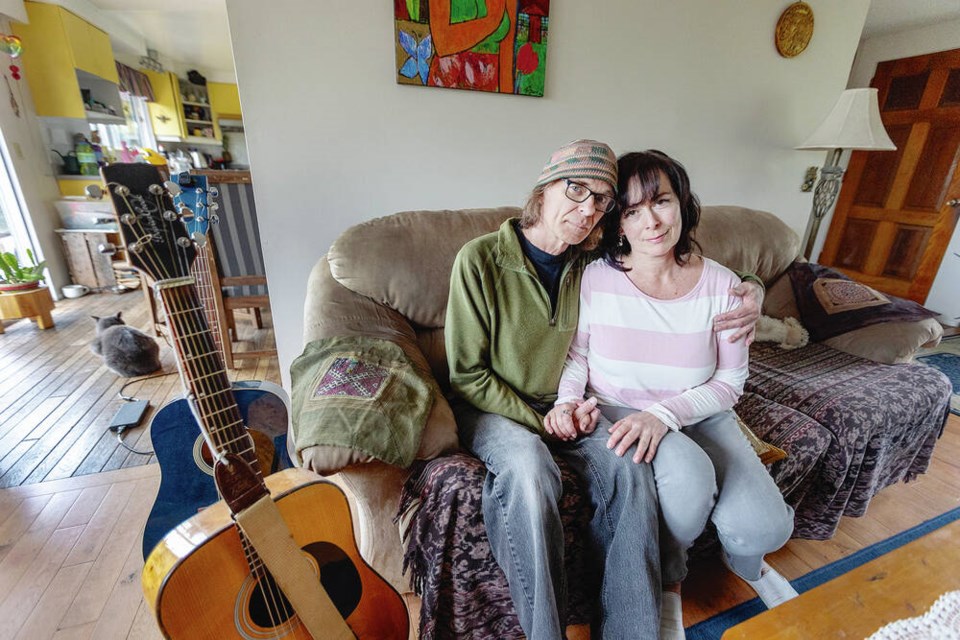Bernie Radelfinger found his recent hospital stays so degrading and traumatic that he fears ever going back.
Between December and March, the Sooke resident had three lengthy stays — spending 10 to 14 days in the hallway each time — for what was eventually diagnosed as idiopathic pancreatitis.
At one point, the 64-year-old was given a suppository in a hallway at Victoria General Hospital.
“I felt very degraded,” Radelfinger said.
“Every time I feel a pain [now] I sort of jump. I think of going back to that floor — part of that jump is dread.”
Wife Elena Christians, 58, said her husband had “no privacy, no dignity” and with each stay in the hallway she escalated her pleas for a room. She believes the “hallway medicine” exacerbated the health crisis and made the experience all the more traumatizing.
The Sooke couple, both educational assistants, decided to share what happened to them after reading a Times Colonist story . The 87-year-old spent nine days of his 10-day stay in the hallway of the same hospital trying to recover from serious infections.
On Thursday, B.C. Premier David Eby called Roberts’ story disappointing, saying it’s hard enough to have to go to hospital.
“But to have to stay in a hallway doesn’t meet the standards of any British Columbian in terms of the care that you should get in this province,” Eby said during an unrelated media availability.
The premier said the health-care system is under significant strain due in part to a “massive” influx of population at the same time as a wave of post-pandemic retirements that has left remaining health-care workers overworked and stressed.
“I am really disappointed that this gentleman had to go through this experience, but to him and to all British Columbians, we will work night and day to make sure that you get the health care that you deserve,” he said.
Christians said the only explanation they got as to why her husband was in the hallway was that he was otherwise “mobile.”
“We are shocked at the state of our medical system,” she said. “Staff are overworked, patients line the hallways — a fire safety issue, for sure — and some are not getting the care and help they need.”
Radelfinger was rushed to Victoria General by ambulance on Dec. 13. He spent nine days of his stay in the hallway “in extreme pain, unable to eat, attached to an I.V. and having to navigate himself two rooms down the hallway to use the washroom.”
The couple said “lots of other patients” were treated in the hallway over that time.
Christians said she was at her husband’s bedside daily while he lay moaning in pain. “I was worried all the time.”
A privacy partition did little to help. Her husband’s belongings were on the floor at the end of the bed in the hallway “where the silverfish crawled.”
“It was awful for me as well,” she said. “Sometimes I’d get a chair but I’d have to move every five or 10 minutes because different people or equipment was being wheeled through, the dirty laundry or the food cart was coming through, we didn’t have any privacy and it was always noisy.”
Radelfinger was eventually diagnosed with idiopathic pancreatitis of unknown cause and not related to common causes such as alcohol or pre-diabetes. Initial treatments weren’t effective and he lost 35 pounds.
He was moved into a hospital room over Christmas and discharged Dec. 27. The couple fear he was sent home too early because the hospital needed the bed.
On Jan. 4 the couple went to the hospital for a follow-up CT scan. It showed Radelfinger had developed a blood clot on his liver and a cyst on his pancreas. He was sent home with blood thinners.
Four days later, Radelfinger woke up in a full pancreatic attack. He was grey in pallor, clammy to the touch, vomiting and going into shock. He was rushed back to hospital, where he spent another nine days in the hallway.
Christians said her husband was then discharged Jan. 17, again even though “he was not ready to be released.” He returned to the hospital that night.
This time, Radelfinger spent two weeks in the hallway before getting a room. He went home on March 1.
Christians said for much of the time her husband was in excruciating pain. “I was there almost every day with him, advocating and caring for him — making sure he didn’t feel alone.”
Radelfinger has been told his recovery will likely take up to a year. He said the effects of the hallway medicine will stay with him forever. The couple said nurses were excellent but seemed understaffed and overwhelmed by the workload. They said one doctor mentioned having worked 31 days straight.
Christians said since her husband returned home, she’s doing “everything [possible] to keep him out of hospital.”
Asked on Friday if it’s a physical beds or staffing issue that has seen patients treated in hallways, Island Health referred to its previous statement stating hospitals across the province are busy and capacity issues are an ongoing challenge.
“We never turn patients away,” the statement said. “When our sites are extremely busy, at times, some patients are being cared for in temporary places, including hallways. We know this is not ideal, and we apologize.”
Eby said the province has a number of strategies, including expansions or new builds of 15 hospitals across the province and a human resources plan that includes a new medical school at Simon Fraser University, to open in 2026, to train additional health-care workers.
>>> To comment on this article, write a letter to the editor: [email protected]




